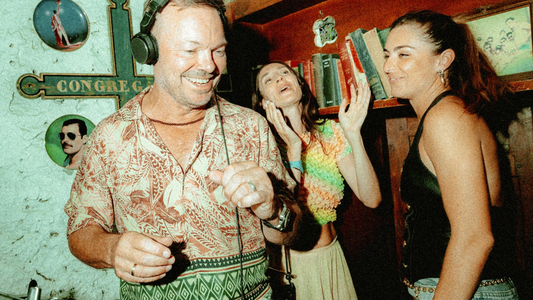
Caetano Veloso – Transa (1972)
By Rafi Mercer
A guitar strums softly, loose and conversational, like someone playing in a living room rather than a studio. Then Caetano Veloso’s voice enters — intimate, melodic, slightly weary, yet filled with warmth. He sings in both Portuguese and English, moving easily between tongues, as if home exists in many places at once. This is Transa, released in 1972, a record born of exile that became one of the defining statements of Brazilian music: tender, political, playful, and profoundly human.
The context is essential. Veloso, along with fellow Tropicalia artists like Gilberto Gil, had been arrested and exiled by Brazil’s military dictatorship in 1969. After a brief imprisonment, he was forced to relocate to London. There, surrounded by cold weather and foreign streets, he found himself both alienated and inspired. Transa was recorded in that exile, its title a Brazilian slang word that carries multiple meanings: transaction, affair, trip, entanglement. The album is precisely that — an entanglement of cultures, languages, emotions, and memories.
The opening track, “You Don’t Know Me,” is conversational and self-aware, sung partly in English. Veloso addresses both himself and his listeners, blurring lines between personal diary and performance. “Nine Out of Ten” brings reggae rhythms into Brazilian songcraft, reflecting the London soundscape he was living in. Its refrain — “Nine out of ten movie stars make me cry” — is both humorous and melancholic, a comment on displacement and longing.
“Mora na Filosofia,” a samba originally written by Monsueto Menezes, is reimagined with Veloso’s delicate guitar and conversational phrasing. He makes the classic his own, folding tradition into exile. “Triste Bahia” is one of the album’s centrepieces: a sprawling track that blends samba rhythms with electric guitars and Afro-Brazilian percussion. Its lyrics, drawn from seventeenth-century poet Gregório de Matos, lament the colonial exploitation of Bahia, Veloso’s home state. In his hands, the lament becomes both historical and immediate — exile within exile.
“It’s a Long Way” mixes English lyrics with Brazilian sensibility, balancing folk intimacy with global outlook. “The Jitterbug Waltz,” a cover of Fats Waller’s jazz standard, closes the album with lightness and humour, a nod to Veloso’s wide-ranging influences. Across the record, the interplay of languages, styles, and moods creates something unique: music that is at once Brazilian and borderless, deeply rooted and expansively global.
What makes Transa so extraordinary is its intimacy. Despite the political context, despite the pain of exile, the record never feels heavy-handed. It is filled with warmth, humour, generosity. Veloso sings as if to friends gathered in a small room, his guitar a constant companion. Even when addressing sorrow or injustice, he does so with melody and tenderness. This inclusivity is part of its power: it welcomes listeners of all kinds, across genders, cultures, and generations.
For Brazilian audiences, the album carried deep resonance: a voice of exile sending back songs of longing and resilience. For international listeners, it was an entry point into Tropicalia and Brazilian music more broadly, proof that exile could produce not only sorrow but creativity. Its mixture of Portuguese and English made it accessible while preserving its local flavour.
On vinyl, Transa glows. The warmth of the pressing suits Veloso’s voice and guitar, the percussion resonating in the room, the intimate atmosphere heightened. The surface crackle feels like part of the record’s intimacy — the sound of exile transmitted through imperfect, physical medium. The sleeve, with Veloso’s bearded face framed by long hair, captures his balance of vulnerability and charisma.
Fifty years on, Transa remains one of Veloso’s most beloved works. It embodies the Tropicalia spirit — playful, hybrid, border-crossing — while also reflecting the pain and possibility of exile. It shows that music can hold contradiction: joy and sorrow, humour and protest, intimacy and universality.
To play Transa today is to step into Veloso’s exile — not as history lesson, but as human conversation. His voice carries warmth across decades, his guitar creates a room wherever it is played, his words remind us that even in exile, even in dislocation, music can create belonging.
Rafi Mercer writes about the spaces where music matters. For more stories from Tracks & Tales, subscribe, or click here to read more.







